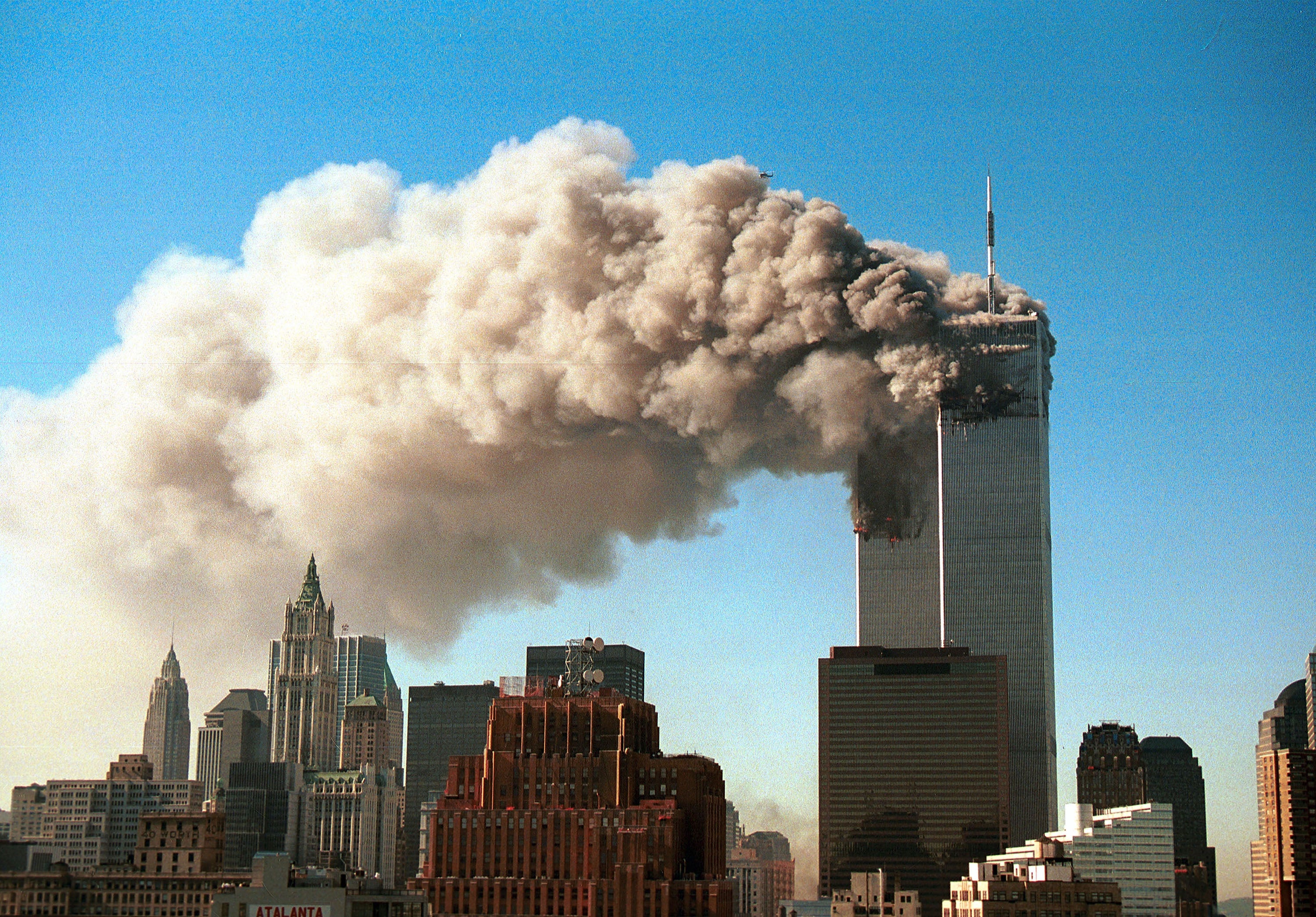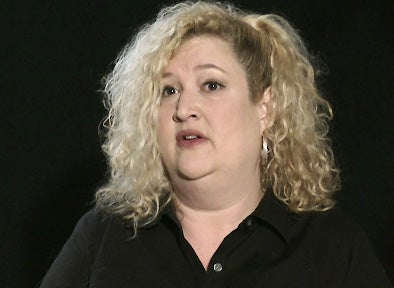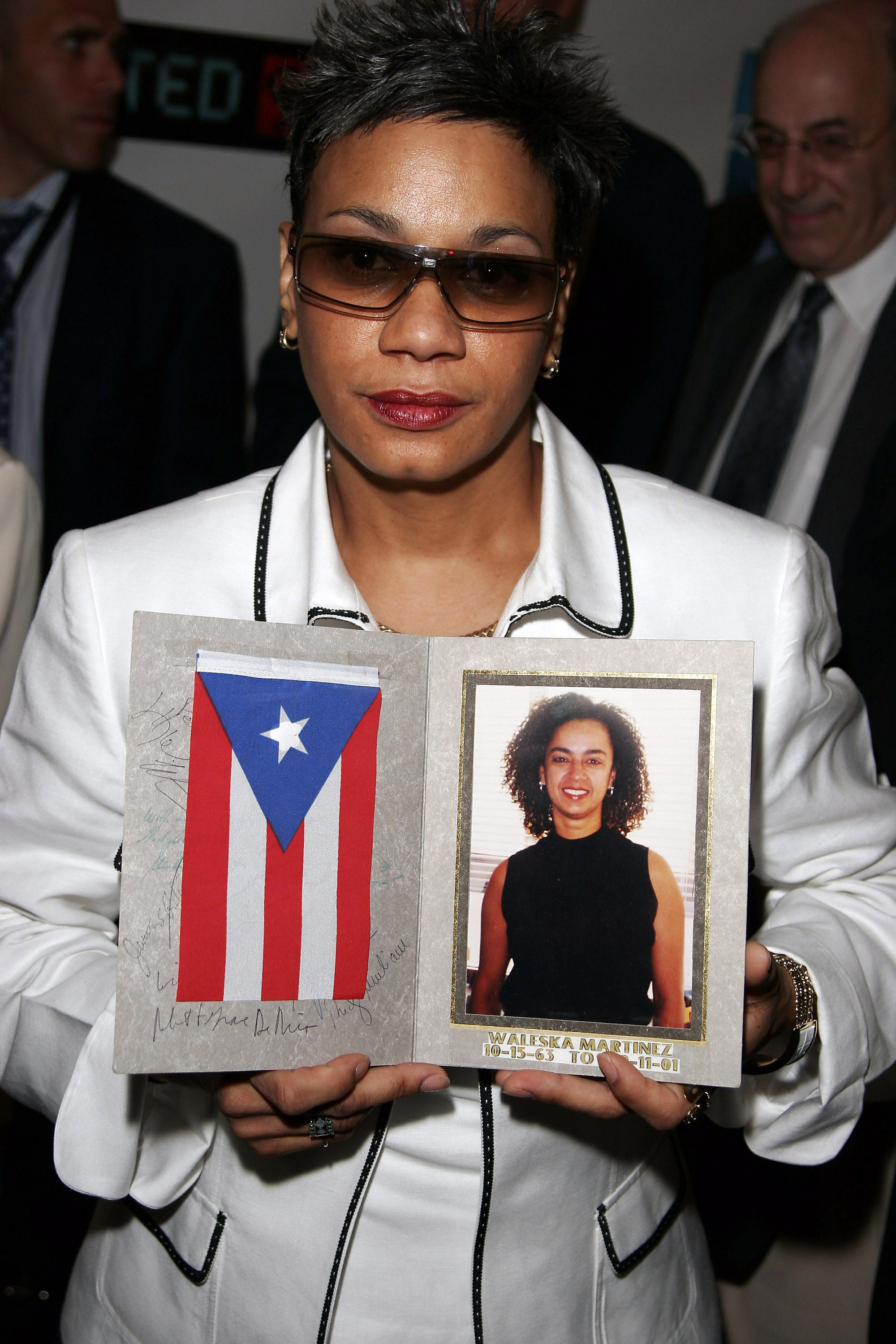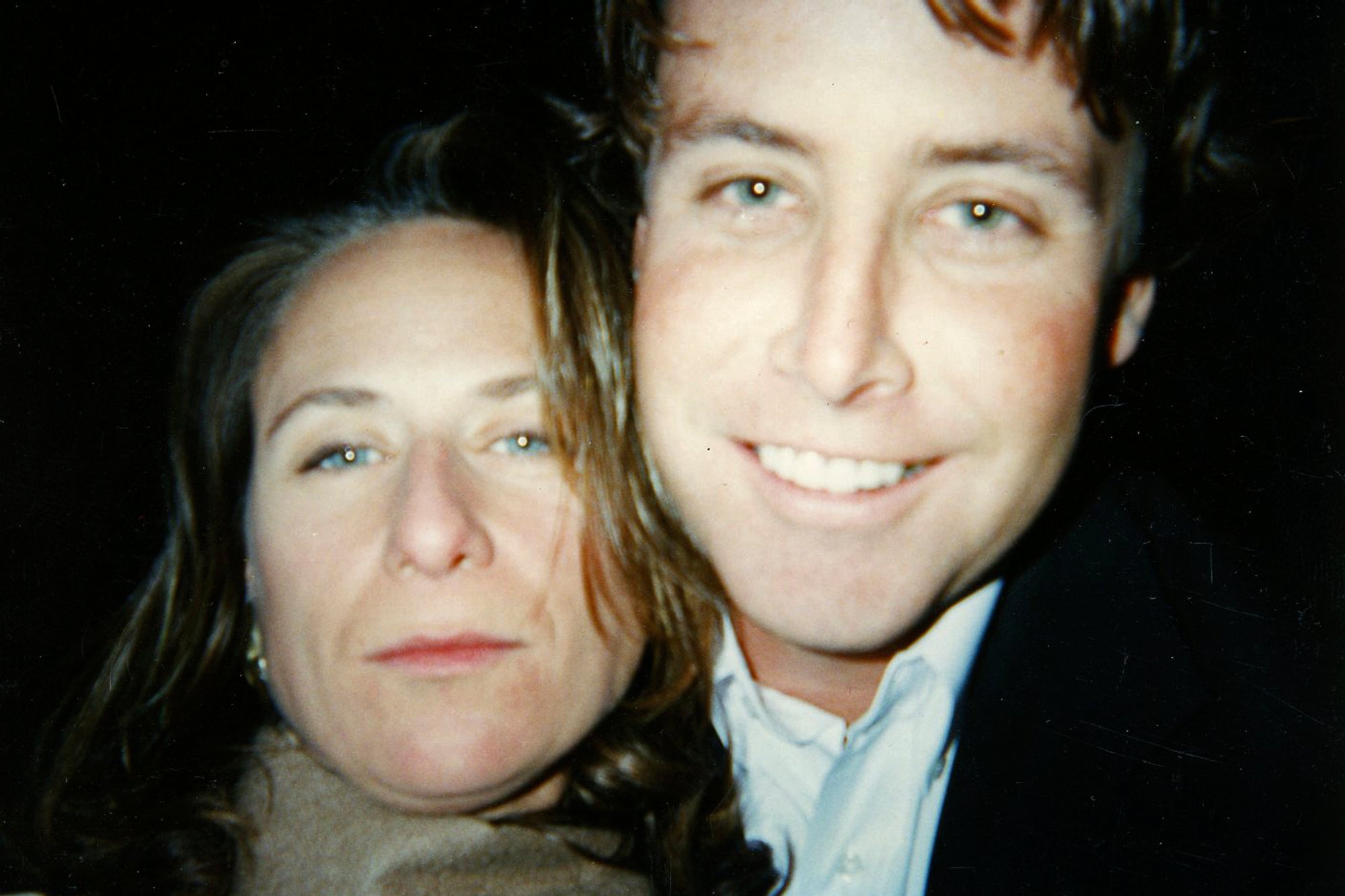‘It’s still resonating’: 9/11 families and survivors on the last 20 unimaginable years
For those who lived through it, 9/11 remains an event too great for closure, writes Josh Marcus


In the months immediately after 9/11, Wendy Lanski was a woman submerged.
Physically, she’d managed to make it out of the north tower of the World Trade Center shortly before it collapsed, running until she reached a rescue boat at the water’s edge. Mentally, she never left the building.
How can you forget watching people jump to their deaths, then rewatching them on the news and in your head? She wondered why she was allowed to live, when people like her dear friend Abe Zelmanowitz, two floors below, had died, staying behind to help a friend who was in a wheel chair.
Six months later, she found some measure of solace during a visit to the Holocaust museum in Washington, DC. She struck up a conversation with an older gentleman. As they shook hands, she saw the numbers etched into his forearm. They were both members of the small, strange cohort of people who survived one of their century’s defining tragedies.
“He grabbed my hand and he said, ‘Never look to forget, never look to go past it, incorporate it into who you are,’” Ms Lanski remembers. “If this man, who was probably in his nineties at the time, if he has had a life for however long and he can still smile, and he’s giving tours and he can do something, it just gave me hope,” she said. “You get resilience from other people.”
The attacks of 9/11 remain an event too great for closure. It impacted too many people too deeply for one meaning to be drawn from the tragedy. Those who seek something definitive are the proverbial blind men, trying to describe an elephant.
No one understands this more acutely than those directly affected by the atrocities of that day. Their losses were incalculably personal – friends, siblings, parents, wives, unborn children – and yet instantly global; the attack became a media spectacle, changed the face of US politics, and remains an immovable anniversary on the calendar.
On the 20th anniversary of 9/11, or the 20th commemoration as some prefer to call it, The Independent spoke with some of these survivors and family members. Their experiences are a mosaic, not a monolith.

After 9/11, some channelled their pain outward, into organising and activism, while others turned in, seeking comfort in fellow 9/11 families and their own memories, protecting the stories of their loved ones from a world that subtly, but insistently, asked them to move on, to make their grief more palatable. The events of 9/11 sent them to places they never imagined: to Mexico as a diplomat, backstage with Bono in San Francisco, to the edge of suicide and back.
The only common thread in their stories is that of human resilience and community. Two decades on, survivors say amid the pain, violence, and hate of the modern world, we have to remember it’s possible to be something more.
Once the shock wore off, after seeing the towers fall, Kristen Cleary, a teacher from just north of the city, wrestled with a question innumerable New Yorkers would ask in the coming days: how can I help?
“There was a real sense of, ‘What can we do?’” she says. “I was not qualified for recovery work, but sure, I could serve those who were. Whatever our backgrounds, whatever we came from, we felt this sense of purpose.”
She began volunteering three nights a week, pulling eight-hour shifts after work in the Salvation Army tent adjacent to ground zero, serving meals to first responders. There were moments of warmth, when the soot-covered firefighters would smile as they read letters of encouragement from around the country, and the lunar cold of grief, when all activity at the site, sometimes called “the pit”, would pause in silence as an “honour guard” carried out each successive body that was recovered.

Kristen was joined by her mother, Haydee, a Puerto Rican immigrant who’d grown up poor in the Bronx before being the first person in her family to go to college. Haydee became a social worker, the kind of person who ran Thanksgiving food drives at schools, and the younger workers and first responders all gravitated toward her maternal presence amid the horror of the pit.
This spirit of coming together inspired Kristen to join the US State Department, where she worked for a time at the US consulate in Monterrey, Mexico.
“It was kind of directly inspired by my peers at the World Trade Center, feeling like, you need to forge relationships,” she says. “When people understand each other, maybe they’re less likely to hate each other.”
But this same selfless drive may have killed her mother. Haydee passed away from endometrial cancer in 2010, and Kristen believes the toxins at ground zero accelerated the case. They have still never been able to receive survivor’s benefits from the government, since her cancer wasn’t among the recognised conditions for compensation.
“My mom was the type that would always put other people before herself. There is that sense of wanting that acknowledgement,” Kristen says. “I feel she should be eligible for that, that what she did had a price. She was willing to pay for it. None of us really understood how toxic it was.”
The alienation of being a 9/11 family member runs deeper than bureaucracy. You are expected to go about your life carrying a grief few can understand, victims’ relatives say.
“For me, every day is 9/11,” says Lourdes Lebron, whose younger sister Waleska Martinez was killed on flight 93. “I believe that day should be out of the calendar.”
When she learned her sister had died, Lourdes tried to throw herself out of a moving car. As children, she and Waleska helped look after their brother, who had cerebral palsy and difficulty speaking, but they could both understand him. Consumed by grief after 9/11, he died by suicide. After that, the family stopped celebrating birthdays or putting up Christmas decorations.
“For the first maybe 10 years, I was in therapy, I was depressed,” Lourdes explains. “I was lost mentally. There was nobody to call when I was sad. [Waleska] always was there, she understood me. She was my sister but acted like my mother.”

The only way she has managed to carry on was by doing two very different things: trying to decentre the memory of 9/11 in her life, while holding close that of her sister. Lourdes has hundreds of videos and pictures of Waleska. She goes through them all the time, and hands out photos whenever she speaks to young people about 9/11.
“I started watching the videos and laughing at what happened, happy happy moments,” she says. “That’s what I keep alive. Those happy moments when she was alive. Together, they start deleting the painful day. I like to see the pictures.”
But she’s done talking about 9/11. This is the last year she plans to speak publicly about that day. It’s just too painful. Instead, she hopes people spend 9/11 as a day of service, turning a day when the world lost so many people into one where we help them.
“That day is so painful. Everything is bringing me back every year,” she says. “But if I talk about my sister, I will keep the memory alive. I would like to have 9/11 be a day to do something good.”
For many 9/11 families, however, it’s hard to focus on remembering the goodness and communal spirit that came out of that day, or even on the memories of loved ones. Powerful people have made 9/11 into much more than that.
The attacks were used to justify the repression of Muslims, Sikhs, and Middle Eastern people at home, and wars spanning multiple countries abroad and multiple decades on through to the present. More than 15,000 US service members and contractors died during the “war on terror”, not to mention hundreds of thousands of civilians. From this death, a handful of defence companies have become handsomely rich.
While many in the survivor community loathe the politicisation of their experience, for Terry Greene, whose brother Donald was on flight 93, she felt like she had no other choice. The attacks had already been politicised. Terrorism is political. And people were making war in Donald’s name.
“They desperately wanted to portray families as wanting some notion of closure through revenge and getting bad guys, which could be whole countries or a whole religion. Twenty per cent of the world’s people are Muslim. That somehow that would solve things or make the world better?” she says. “I think for some families, it was a consolation to feel like we were on the offense, but for the ones I was meeting, it was mostly painful to have our loved ones used that way.”
Terry is a member of September Eleventh Families for Peaceful Tomorrows, an anti-war group. Her work has brought her into contact with other victims of terror and hate violence from Rwanda, Sudan, Israel, Palestine, Russia, and Spain. People like her, Terry found, tend to have both a good sense of humour and a deep abhorrence for war, lest any other families have to know the loss they have endured.
“All the people we met recognised that that’s not the reaction, and they all felt like it was more human connections and building bridges, rather than bombing them, that would make for a better future,” she says.
She remembers with a laugh how one member of the group, traveling through Iraq speaking with US soldiers and Iraqis, was surprised to learn both groups blew off steam by watching the same TV shows.
“They’re watching Seinfeld at night, both of them, and then going out in this mad thing we call war to kill each other,” she says.
Healing from all the pain and war is going to take a major culture shift, according to Jack Grandcolas, whose wife Lauren was killed on flight 93. She had been carrying their unborn child, and left Jack a voicemail from an in-seat phone on the plane before it crashed. He struggled for years with PTSD after 9/11, though he prefers to call it PTSI, for post-traumatic stress injury, to normalise the condition and underscore for those living with it that it isn’t their fault. For a time, he kept Lauren’s clothes, which still smelled like her.
“You feel like you’re going down a normal highway of life then all of sudden everything is yanked away from you that was normal,” he explains. “You almost feel like you’re barefoot and there’s nothing but rocks underneath you, it’s incredibly hard to go forward. I walked to the dark side and looked into the abyss, and it’s a deep dark place.”
Eventually, through therapy, Jack learned ways to mourn both his wife and the child he’d never get to know. He’s writing a memoir about his experience, and how to live with tragedy.

It’s called From The River To The Sea, borrowing a line from U2’s “One Tree Hill“, a song the band wrote about a dear friend who had died. Through their mutual friend, the actor Sean Penn, Bono learned about Lauren and Jack’s story. Their first date had been a U2 concert in 1985.
At a concert in Oakland, the band surprised Jack by playing an acoustic version of “One Tree Hill”, despite rarely performing the song live, since it is so personal. After the show, Bono signed a ticket from that first date that Jack had kept in his wallet. He wrote: “Like a river to the sea, see you for a swim.”
Everyone from 9/11 families to world-famous rock stars carries trauma, and Jack hopes his experience can help others confront theirs, especially during the slow-burning horror of Covid-19.
“It really became evident that I should publish the book after all the deaths of Covid,” he says. “When they started having 9/11-event type numbers every day, you think that you wouldn’t stand for that, but here we are some 650,0000 passed, tragically, sadly, quickly and remotely, you’re going to have a massive ripple effect of mental health issues.”
Wendy Lanski, the woman who escaped the north tower, said she hopes people don’t try to wish away the pain that so many 9/11 families – or survivors of any other tragedy – will always carry.
“People have crafted a life and gone forward, but we’re not the same,” she says. “There’s a feeling in your soul that you are not whole, that there’s a gap, that you are broken.”
Rather, she hopes people recognise that pain for what it is, and recognise too the strangeness of the world we live in now, where terrorism is a regular part of peoples’ lives.
“There’s a whole generation who have never grown up in a world without domestic terrorism. It’s almost just a given,” she says. “People are numb to it.”
But we shouldn’t be, according to these survivors. Those who lived through 9/11 understand the utter preciousness of life, and what’s possible when people dedicate themselves to working and living by that ideal.
Join our commenting forum
Join thought-provoking conversations, follow other Independent readers and see their replies
Comments


Bookmark popover
Removed from bookmarks